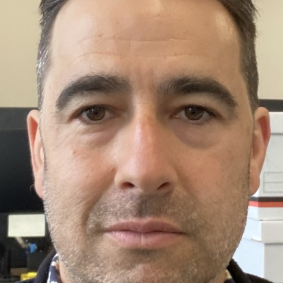François Tessier
Master's degree in urban studies (2005)
Research officer, Direction régionale de santé publique de Montréal
“We mustn't stop at what we think is meant for us.”
After completing a bachelor's degree in geography at UQAM, François Tessier was keen to broaden his horizons. He then discovered the Urban Studies program, a joint venture between UQAM and INRS, and chose to do his master's degree here, attracted by the idea of adding a second institution to his career path and diversifying his view of cities and territories. “I wanted to change my profile a little, broaden my palette”, he sums up.
On his arrival, he discovered a study environment on a human scale. He remembers the good relations between students and professors, and the kind supervision he received, especially from his master's supervisor, André Lemelin. “He was a very human person, who helped me both morally and in terms of understanding.” Under his guidance, he explored quantitative tools that, at first glance, were outside his comfort zone. This foray outside his comfort zone proved to be a turning point: he realized that he could broaden his skills and go beyond his initial profile. "It was out of my natural range, coming from a more qualitative profile. But it made me realize that I wasn't confined to a single sphere."
His dissertation, which looked at the economic sectors and length of residence of immigrant workers in comparison with Canadian-born workers, led him to explore new themes that broadened his field of interest. “In the end, I really enjoyed the subject.”
With his diploma in hand, he joined the Direction régionale de santé publique de Montréal in 2004, initially as a research technician for a temporary replacement. "I told myself that I was getting on board the train, perhaps in a more backward carriage, but that it would allow me to discover public health.” This first position opened the door to a field he would never leave. Today, he is a research officer in the Urban Planning and Mobility team, where he works on health issues related to the built environment: prevention of unintentional trauma, safety around schools, mobility of vulnerable people. Spatial analysis, data and cartography play a central role in his work.
He sees a direct link between his training and his career path: the Master's degree consolidated his interest in urban environmental issues, while giving him the tools to better understand research processes and build his confidence.
Today, he wants to continue evolving his work, developing new projects and staying in the action. "I'm lucky to work in a sector where there are so many services and themes. I'd like to continue developing projects, updating studies, finding new leads... staying in the action." His advice to students: don't be afraid to think outside the box. "You have to trust yourself." An openness to which he owes much and which continues to guide his career.
[Interviewed in May 2025.]

